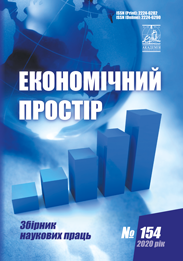PECULIARITIES AND PREVENTION OF PROFESSIONAL BURNING OF PERSONNEL MANAGERS
Abstract
The problem of professional burnout is one of the most pressing problems of our time. Employees of modern businesses and organizations whose activities involve emotionally complex professional responsibilities are prone to professional burnout. Occupational burnout in an employee occurs as a defensive reaction to stressful influences, causing a negative impact on both the psychological and physical condition and on the effectiveness of employees. For this reason, the purpose of the article is to investigate the issues of burnout that are manifested in a state of exhaustion, personal distance from teamwork and teamwork, and to reduce the motivation to exercise one's professional responsibilities. During the research, the level of professional burnout of the personnel managers was determined and the factors and causes of its occurrence were identified. Stress and burnout have become an increasing and often-discussed phenomenon over the last decade. The most common sources of stress among adults in modern world include work, money, and health. Levels of stress vary from person to person depending on a variety of factors that can influence such feelings, including a person's employment status, age, income, and ethnicity. The article analyzes the professional burnout syndrome as a process, examines the cause and effect of forming it in HR managers. Managerial function is a stressful activity. Manager is a person who controls all the resources in an organization. He is under constant pressure to perform better and better. The authors investigate means of prevention and anticipation, the main of which are to promote change of activities, maintaining a work-life balance, having a comfortable arrangement of work space and recreation areas in the company, creating conditions for personal development and life-long learning. The professional burnout of a HR manager is a significant problem in this area of work, as the work of an HR manager is associated with significant communication workload, high levels of stress and responsibility, variety of functions and lack of time resources, overtime, and high levels of competition.
References
Agrawal S., Wigert B. Employee Burnout (2018). URL : https://www.gallup.com/workplace/237059/employee-burnout-part-main-causes.aspx (дата звернення: 10.0.2020).
Freudenberger H.J. (1974) Staff burnout. Journal of Social Issues. Volume 30. Issue 1. Р. 159–165.
Maslach C., Goldberg J. (1998) Prevention of burnout: new perspectives. Applied and Preventive Psychology. № 7. Р. 63-74.
Бойко В.В. Синдром «эмоционального выгорания» в профессиональном общении. Санкт-Петербург : Питер, 1999. 105 с.
Аналітичний звіт за результатами дослідження «Оцінка рівня професійного вигорання працівників гуманітарної сфери» / Т.В. Брижоватий та ін. URL : https://www.prostir.ua/wp-content/uploads/2017/07/NGO-Forum_Burnout_Report_Final.pdf (дата звернення: 10.04.2020).
Войлісовська В. Психологічний супровід кадрової роботи: професійне вигорання. Держслужбовець. 2015. № 6. URL : https://i.factor.ua/ukr/journals/ds/2015/june/issue-6/article-8787.html (дата звернення: 10.04.2020).
Кім О.В., Бохонкова Ю.О. Формування захисних реакцій у психолога та професійне вигорання. Теоретичні і прикладні проблеми психології. 2019. № 2. С. 170–181. URL : http://nbuv.gov.ua/UJRN/Tippp_2019_2_16 (дата звернення: 10.04.2020).
Коновчук Н.С. Основні причини та профілактика професійного вигорання у менеджерів. Правничий вісник Університету «КРОК». 2012. Вип. 14. С. 91–95. URL : http://nbuv.gov.ua/UJRN/Pvuk_2012_14_20 (дата звернення: 10.04.2020).
Лєскова Л.Ф. Аналіз наукових підходів дослідження феномена професійного вигорання працівників соціальної сфери. Науковий вісник Херсонського державного університету. 2017. Вип. 6. Т. 2. С. 154–159.
Орел В.Е. «Феномен выгорания» в зарубежной психологии: эмпирическое исследование и перспективы Психологический журнал. 2001. Т. 22. № 1. С. 90–101.
Попелюшко Р.П. Феномен «професійного вигорання» у практичних психологів. URL : https://elar.khnu.km.ua/jspui/bitstream/123456789/1232/1/10.doc (дата звернення: 10.04.2020).
Практикум по психологии менеджмента и профессиональной деятельности / под ред. Г.С. Никифорова, М.А. Дмитриевой, В.М. Снеткова. Санкт-Петербург : Речь, 2003. 448 с.
Шупта І.М. Способи профілактики та усунення професійної деформація управлінського персоналу. Наукові праці Полтавської державної аграрної академії. 2013. № 1(2 (7)). С. 311–317.
Agrawal S., Wigert B. Employee Burnout (2018) Available at: https://www.gallup.com/workplace/237059/employee-burnout-part-main-causes.aspx (accessed 10 April 2020)
Freudenberger H.J. (1974) Staff burnout. Journal of Social Issues. Volume30, Issue 1. рр.159-165.
Maslach C., Goldberg J. (1998) Prevention of burnout: new perspectives. Applied and Preventive Psychology. 7. рр. 63-74.
Boyko V.V. (1999) Sindrom «emotsionalnogo vyigoraniya» v professionalnom obschenii ["Burnout" syndrome in professional communication]. SPb.: Piter. (in Russian)
Bryzhovatyi T.V., Volhina O.M., Halai A.O., Dmytriiev D.O. (2017) Analitychnyi zvit za rezultatamy doslidzhennia «Otsinka rivnia profesiinoho vyhorannia pratsivnykiv humanitarnoi sfery». [Analytical report on the results of the study "Assessment of the level of professional burnout of humanitarian workers"]. Available at: https://www.prostir.ua/wp-content/uploads/2017/07/NGO-Forum_Burnout_Report_Final.pdf (accessed 10 April 2020)
Voilisovska V. (2015) Psykholohichnyi suprovid kadrovoi roboty: profesiine vyhorannia. [Psychological support of personnel work: professional burnout] Derzhsluzhbovets, № 6, Available at: https://i.factor.ua/ukr/journals/ds/2015/june/issue-6/article-8787.html (accessed 10 April 2020)
Kim O.V., Bokhonkova Yu.O. (2019) Formuvannia zakhysnykh reaktsii u psykholoha ta profesiine vyhorannia [Formation of protective reactions in a psychologist and professional burnout.]. Theoretical and applied problems of psychology, №2, рр. 170-181.
Konovchuk N. S. (2012) Osnovni prychyny ta profilaktyka profesiinoho vyhorannia u menedzheriv [Main causes and prevention of professional burnout in managers]. Legal Bulletin of KROK University, Vol. 14, pp. 91-95.
Lieskova L.F. (2017) Analiz naukovykh pidkhodiv doslidzhennia fenomena profesiinoho vyhorannia pratsivnykiv sotsialnoi sfery [Analysis of scientific approaches to the study of the phenomenon of professional burnout of social workers]. Scientific Bulletin of Kherson State University, Issue 6, Volume 2, pp. 154-159.
Orel V. E. (2001) «Fenomen vyigoraniya» v zarubezhnoy psihologii: empiricheskoe issledovanie i perspektivyi [“The phenomenon of burnout” in foreign psychology: an empirical study and prospects] Psychological Journal, Issue 22, № 1, pp. 90–101.
Popeliushko R.P. (2013) Fenomen «profesiinoho vyhorannia» u praktychnykh psykholohiv [The phenomenon of "professional burnout" in practical psychologists]. Available at: https://elar.khnu.km.ua/jspui/bitstream/123456789/1232/1/10.doc (accessed 10 April 2020)
Nikiforov G. S., Dmitrieva M. A., Snetkov V. M. (2003) Praktikum po psihologii menedzhmenta i professionalnoy deyatelnosti [Workshop on Management Psychology and Professional Activities] SPb.: Rech (in Russian)
Shupta I. M. (2013) Sposoby profilaktyky ta usunennia profesiinoi deformatsiia upravlinskoho personalu [Methods of prevention and elimination of professional deformation of management personnel] Scientific works of Poltava State Agrarian Academy, № 1 (2 (7)), pp. 311-317.



